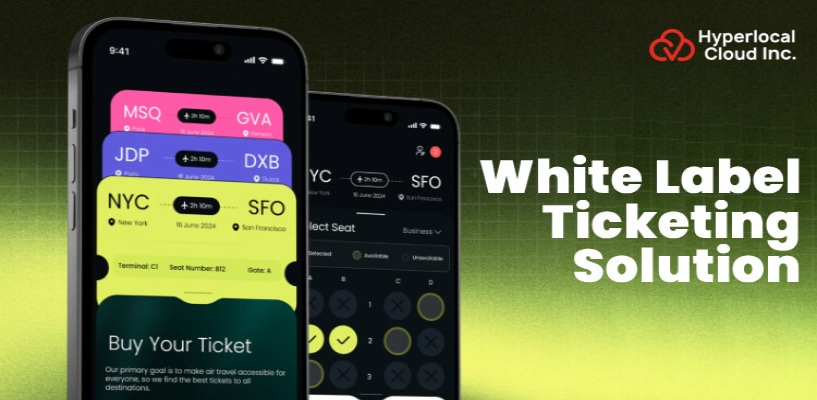White Label Ticketing Solution | Create A Ticket Booking Platform

The ticket industry undergoes a remarkable change and experiences rapid progress. Ticketing apps are now the most important way for customers to buy tickets for events, shows, travel, and other experiences. As the digital smartphone era is at its peak, users prefer to book tickets online because it is a fast, simple, and safe method to buy tickets at any time.
This results in businesses, entrepreneurs, startups, or SMEs that are looking to set a revolutionary approach in the ticket booking industry, and can build their own ticketing platform either with white label solutions or from scratch. From concerts and sports games to conferences and virtual webinars, the need for robust ticketing has expanded across various industries.
What is a Ticketing Solution?
A ticket solution is a software, platform, or application designed to manage the entire process of selling, distributing, and verifying tickets for events or services. The ticket booking platform manages everything from booking and inventory management to payment processing and issues in ticket bookings. These solutions automatically organize workflows for organizers of events, which were traditionally manual. Instead of printing and distributing tickets physically, you can, for example, send e-tickets immediately via email using a digital ticket platform or via SMS. It reduces costs and delivery time.
White label ticketing solutions typically include features such as:
- Event and session scheduling
- Ticket type configuration (general, VIP, group, early bird)
- Real-time ticket inventory tracking
- Payment processing through multiple gateways
- Customer relationship management (CRM)
- Reporting and analytics to monitor sales and attendance
- Access control tools such as barcode or QR code scanning
Start Your Own Ticket Booking Platform Today
The Advantages of Investing in White Label Ticketing Software
Investment in the white label ticket booking software provides a wide range of benefits, especially for companies that want to maintain control of the brand and customer experience by taking advantage of strong technology. Have a look at the information below to understand why investing in a white label ticketing platform is beneficial for your business.
1. Full Brand Ownership and Customization
One of the main benefits of a white label ticket booking platform is the ability to fully customize features and functionalities. Companies can change generic branding with their own logo, color palette, and design style. The white label ticket booking platform promotes customer trust and loyalty, enhancing business growth.
2. Significant Cost Savings
Developing a ticket platform from scratch involves hiring developers, designers, security experts, quality assurance experts, and testers. The process can take months or years to develop and costs too much. White Label Solutions significantly reduces the costs, as the platform has already been created and maintained by the white label solution providers.
3. Rapid Deployment and Market Readiness
Market time is an important factor in a competitive ticket booking site. Depending on the need for adaptation, white label ticketing solutions allow companies to quickly start their business journey and utilize marketing campaigns without delay. Rapid deployment through a white label solution allows companies to respond to market opportunities, seasonal requirements, or special opportunities faster than deployment from custom solutions.
4. Scalability to Meet Growing Demand
A ticket booking software is designed to support a wide range of international events, from small local meetings to international festivals with thousands of participants. The software can handle large volumes of traffic and transactions without displaying screen issues. When a business grows and hosts several large events, the ticket platform can grow and reach a large scale.
5. Access to Advanced Features and Continuous Upgrades
With a white label ticketing solution, companies receive continuous upgrades without additional development work. They have access to advanced features, such as real-time analysis, automated market equipment, integrated CRM, and a safe payment gateway, which can be difficult and expensive to develop from scratch.
6. Lower Operational Risk
The development of the ticket system internally bears the risk associated with software errors, security weaknesses, and payment compliance. The white label solution providers invest heavily in quality assurance, cybersecurity, and infrastructure credibility. By taking advantage of a tested platform, the business reduces operating risk and avoids disruptions that may damage its reputation or income.
The Effective Key Features of a White Label Ticketing Platform
When white label solutions are implemented for the development of the ticket booking platform, they will offer several effective features. A detailed overview of this is provided below, which businesses can use to boost user engagement.
1. Custom Branding and White Labeling
This option allows companies to change or customize the branding of the ticket booking platform with their own logo, color, and domain name. The entire customer experience reflects the company’s unique brand identity, from ticketing solutions and events to buying tickets and receiving a confirmation email.
2. Multi-Channel Ticket Sales
A ticket platform enables sales in many channels, including the company’s website, mobile app, social media pages, and even personal sales. This omnichannel capacity maximizes access, satisfaction, and convenience for customers.
3. Secure and Flexible Payment Options
The platform will ensure that customers get safe and flexible transactions to book tickets. This is why the platform supports several payment options, so users can pay through credit/debit, UPI, digital wallet, and other methods. However, this process encourages security compliance.
4. Real-Time Analytics and Reporting
Real-time analysis allows businesses to analyze sales, appearance, and customer behavior with computer-generated decisions. Reporting enables dashboard administrators to optimize marketing campaigns, pricing strategies, and event logistics.
5. Mobile Ticketing and Entry Management
With mobile tickets, customers receive digital tickets with a QR code or barcode that can be scanned at the entrance point to the event. It streamlines check-in, reduces fraud, and eliminates the requirement for a paper ticket or ticket in training.
6. Multiple Ticket Types and Pricing Models
The platform will support a variety of ticket options, including general entry, reserved seats, VIP access, and group discounts. Coupons, referral codes, and advertising customers increase flexibility.
7. Customer Relationship Management (CRM)
Integrated CRM tools help manage customer profiles, track ticket booking history, and enhance communications via reminders of events, newsletters, and special offers. This will be useful to build a strong user base.
8. Seamless Integration with Business Systems
Third-party integration, such as marketing automation platforms, customer databases, financial software, and event management systems, helps increase the operating efficiency of the platform in order for a smooth data flow.
The Top Ticket Booking Platforms
There are several ticketing platforms that have gained huge popularity over the past few years. A detailed overview of the top ticket booking platforms is mentioned below. Have a look:
1. Eventbrite
Eventbrite is one of the most widely used ticket booking platforms. The white label solution for this platform provides extensive customization options and supports a wide range of events. The strength of Eventbrite lies in its popular marketing, scalability with CRM platforms, as well as its usability and integration capabilities.
2. Ticket Tailor
Ticket Tailor is preferred for its cost-effectiveness and simplicity. It offers flexible branding and sales support across multiple channels. Ticket Tailor is ideal for small to moderate-sized event organizers who are looking for an alternative without a complete ticket solution.
3. ThunderTix
ThunderTix provides extensive features, including reserved seating, mobile tickets, and real-time reporting. It is well-suited for theaters, festivals, and sports venues. The platform is highly adaptable and supports different payment portals.
4. AudienceView
The AudienceView targets the intermediate market for organizers of large events with advanced ticket booking, marketing, and financing units. The white label solution for this platform supports complex pricing models, customer division, and detailed analysis.
5. Billetto
Billetto provides a seamless ticket booking platform with a robust white label solution. It is popular among small businesses and social programs, offering comprehensive marketing strategies and ticket sales for social media.
Launch Faster with Our Ready-Made White Label Ticketing Software
How AI-Driven Technologies Benefit the White Label Ticketing Solution?
Artificial intelligence is revolutionizing ticketing software by increasing automation, personalization, and security. Integration of AI with white label ticket platforms provides many benefits:
1. Personalized Customer Experiences
AI can analyze customer data such as previous purchases, history, and preferences. Considering this understanding, this feature may recommend future events, suggest relevant material to increase the interaction and conversion frequency, or tailor messages to users.
2. Fraud Detection and Prevention
AI-operated algorithms monitor real-time transactions to detect deviations, such as suspected purchases, multiple account usage, or fake ticket generation. This feature addresses fraud and protects ventures and customers from financial losses.
3. Dynamic Pricing Optimization
AI models predict demand patterns and adjust ticket prices accordingly. For example, prices may increase because the event date and tickets are in high demand, thereby maximizing revenues. On the other hand, prices can be reduced to encourage sales when demand is slow.
4. AI-driven Chatbots for Customer Support
AI chatbot provides quick answers to average questions about events, ticket policies, refunds, and more. This reduces the burden on customer service teams and enables customers to receive speedy help.
5. Data-Driven Decision Making
The process of machine learning involves a large amount of data to highlight trends and insights. Organizers can make better plans for future events, plan performance, and design marketing strategies that resonate with the target audience.
Who Can Use the White Label Ticketing Booking Platform?
White Label Ticketing Platforms serve a diverse selection of industries and business models. Here you can get a detailed overview that helps you target the specific audience that can facilitate the white label ticket booking platform.
1. Event Organizers and Promoters
From concerts and sports tournaments to commercial conferences and presentations, the features of event organizers depend on the white label ticket booking app that encourages efficient sales, maintains brand identity, and manages large-scale programs.
2. Venues and Theaters
These platforms are used for ticket booking management across various brands in different locations, including theatres, concert halls, sports arenas, and conference centers.
3. Transportation and Travel Companies
Buses, boats, and tour operators use ticket software to make reservations and order tickets evenly. The ability to customize branding helps them to maintain a professional reputation.
4. Educational Institutions
Schools, colleges, and universities manage ticket sales for lectures, workshops, demonstrations, and money-raising programs through white label ticket booking solutions.
5. Corporate Businesses
Establishments that host internal meetings, training sessions, or customer events use white label ticketing software for a professional, branded look.
6. Nonprofits and Community Groups
Charity and local organizations benefit from low-cost white label ticketing solutions that tolerate simple marketing and management of money to boost programs.
Steps to Build A Ticket Booking App
Building a ticket booking app involves a series of well-planned steps to ensure a seamless user experience and smooth backend operations. Whether you choose to develop from scratch or use a white-label solution, the process requires strategic planning, technical development, and continuous optimization.
1. Define Your Business Needs and Goals
Start by clearly emphasizing the goals you want to achieve with a ticket platform. Think about your target groups, types of events, desired features, and budget.
2. Research and Select a Provider
Evaluate many companies that offer white label solutions for a ticket booking platform development. Ask for the demo, compare functional sets, prices, and support options. Choose a partner whose platform matches its needs.
3. Customize the Platform
Work closely with the on-demand app development company to customize branding, configure ticket types, prices, payment methods, and overall workflows. Make sure the platform reflects the identity of your company.
4. Integrate with Your Systems
Connect ticket solutions to your site, CRM, marketing tools, and other systems to ensure data stability and even operation. This will give an impactful approach to your business.
5. Conduct Thorough Testing
Test all aspects of the platform, including ticket sales, payment processing, ticket distribution, and recording confirmation. Identify and solve any technical problems for the purposes before launch.
6. Launch the app
Launch the ticketing apps on the different operating systems, such as on the Google Play Store to target the Android users and the Apple App Store to target the iOS users.
7. Monitor Performance and Gather Feedback
Monitor frequent sales, data, customer response, and system performance to ensure optimal results. Use this information to optimize the ticket experience and solve any problem. Users’ feedback is essential to improve the platform’s performance.
How to Approach a Reliable White Label Ticketing Software Provider?
There are numerous ways that help businesses or startups approach a reliable, experienced, and affordable white label solution provider who can deliver a ticket booking platform. The most common ways are briefly discussed below.
1. Identify Your Business Needs and Goals
While choosing a white label solution provider, it is crucial to understand the needs of your business. Think of some things, such as developing ticket sales, streamlining customer knowledge, or refining the brand. Knowing what you want helps you decide on a reliable supplier that matches your business plans.
2. Research and Shortlist Providers
When you have a clear understanding of your needs, you can start researching potential and recognized ticket booking suppliers. Be sure to analyze a proven tracking list, positive customer reviews, and relevant features that are in accordance with your requirements. Don’t forget to check any customer help or technical support options that they also provide.
3. Request Detailed Demonstrations
It is important to test the software before making a decision. Now, the suppliers you have listed ask for a live demo. This allows you to detect the user interface, understand how the system works, and question its abilities. Under the demo, focus on how comfortable the platform is, customization options are available, and how it is integrated with your existing system.
4. Evaluate Security and Compliance Standards
Ticket platforms handle sensitive customer data, so security is a top priority. Make sure the white label supplier follows the latest security standards and has appropriate data protection measures. Look for facilities such as adherence to the rules, such as encryption, a secure payment gateway, and GDPR or PCI-DSS. This will protect customers’ information and protect your business from potential legal issues.
5. Understand Pricing and Contract Terms
Prices are a key factor, yet they should not be the only decisive factor. Understand the all-inclusive cost system, including installation fees, maintenance fees, and any transaction fees. In addition, you can review the terms of the commitment policies. It is noteworthy to have transparency around prices and improve the requirements with your long-term business needs.
Explore the Monetizing Strategies for a White Label Ticketing Solution
When you build a ticketing platform with white label solutions, it gives you so many different opportunities to generate revenue from it. The monetizing strategies are outlined below; please review them and follow the ones that best suit your needs.
1. Transaction Fees or Service Charges
One of the most common ways of funding the ticket platform is to take a small transaction or service fee for each ticket sold. This fee can be added during checkout and will generate a stable revenue flow for your business without a direct increase in ticket prices.
2. Subscription Plans for Event Organizers
Another way to generate revenue is to offer membership plans for organizers. Depending on the size and frequency of your events, organizers may need to pay monthly or on an annual basis to use the platform. This model is a great alternative to generate revenue and elevate long-term partnerships with organizers.
3. Premium Features and Add-Ons
Providing premium features can help promote the profitability of your platform. Facilities such as priority customer help, advanced analysis, or exclusive marketing tools can be sold to your customers as an add-on. These features will appeal to the organizers who require more adaptation and control.
4. Advertising and Sponsorship Opportunities
You can also make money through advertising if the event promoters and local businesses are interested in advertising your platform. You can offer banner advertising, a sponsored event list, or other promotional opportunities in return for a fee. This can generate additional revenue by providing advertisers with exposure to the public.
5. Data Monetization (With Consent)
Data monetization is a profitable option to generate income in the digital world. By evaluating customer character and preferences, you can highlight awareness that can be sold to third-party companies, such as market research companies or event organizers, to understand the customer’s interest. All you need is a user’s consent to apply this monetization model to your business.
6. Affiliate and Partnership Programs
Participation with other companies can mutually construct favorable income streams. For example, you can work with travel agencies to offer concessional packages for events or market partner marks through affiliated links. These programs can help increase ticket sales by generating extra revenue for your platform.
Customize, Launch, Succeed – Build Your Ticket Platform with Us!
How Much Does it Cost to Build a Ticketing Software?
To build a ticketing platform, the average cost starts from $6,000. The cost can be higher or lower depending on various factors. Businesses that are looking for a white label solution can save on cost and time. However, development from scratch is often expensive and time-consuming. Choosing a well-experienced software development company that has experience in developing different platforms with advanced technologies.
Meanwhile, the overall application complexity, timeline, team expertise, features and functionalities, UI/UX, and third-party integration are the effective aspects of the higher development cost.
Why Partner with Hyperlocal Cloud?
Hyperlocal Cloud provides a unique approach to white label ticket solutions. We focus on providing flexible, scalable, and secure ticket booking platforms that enable companies to streamline their ticketing processes while maintaining their brand identity. We address your business demand and work accordingly so that your business gets a new identity with a strong user base. Also, our team of experts offers round-the-clock support throughout the development process. If you are looking to build a ticket booking platform like Ticketmaster, we are all set to deliver our best to you. Don’t delay, just reach out to us to get an affordable white label ticket booking solution.





